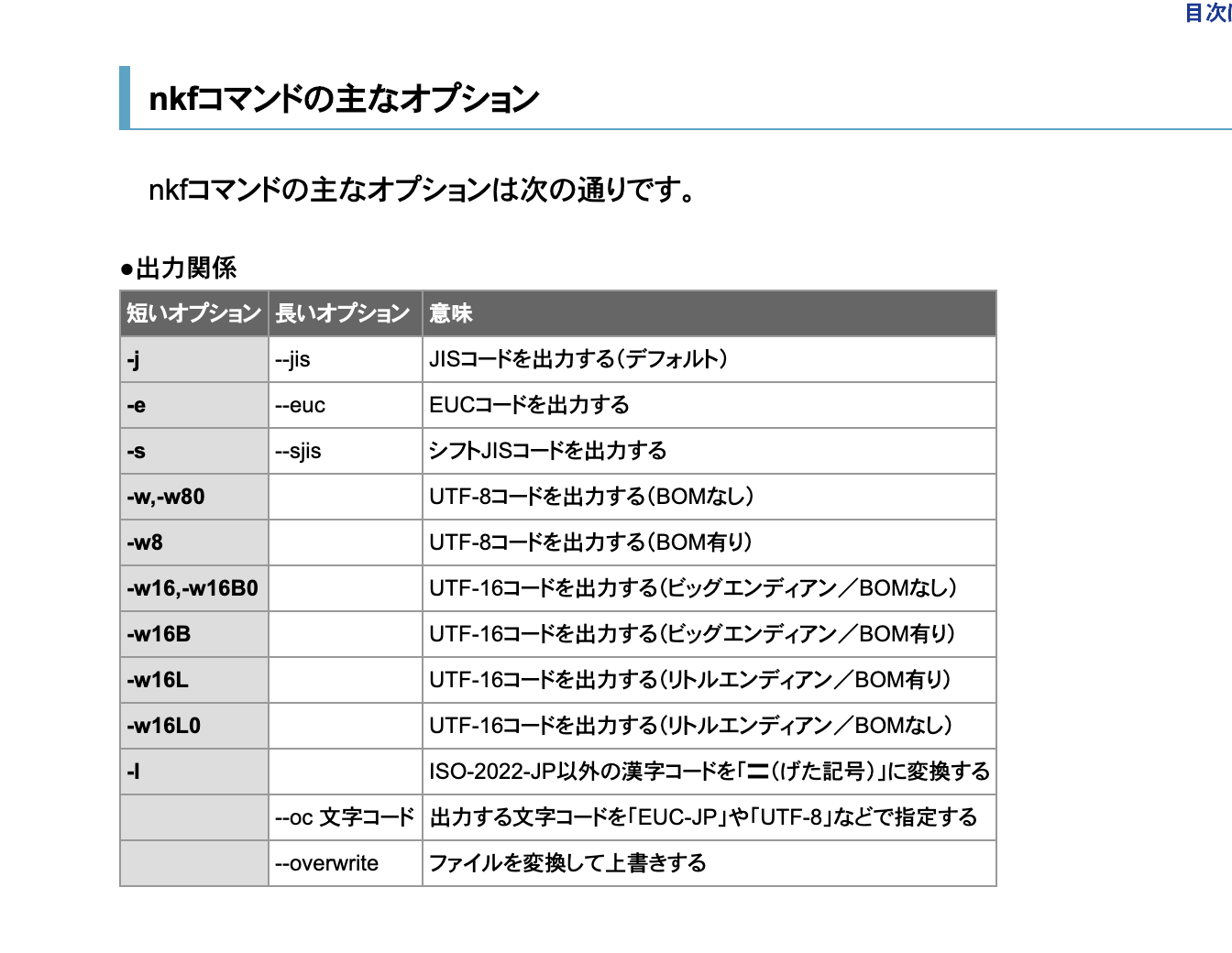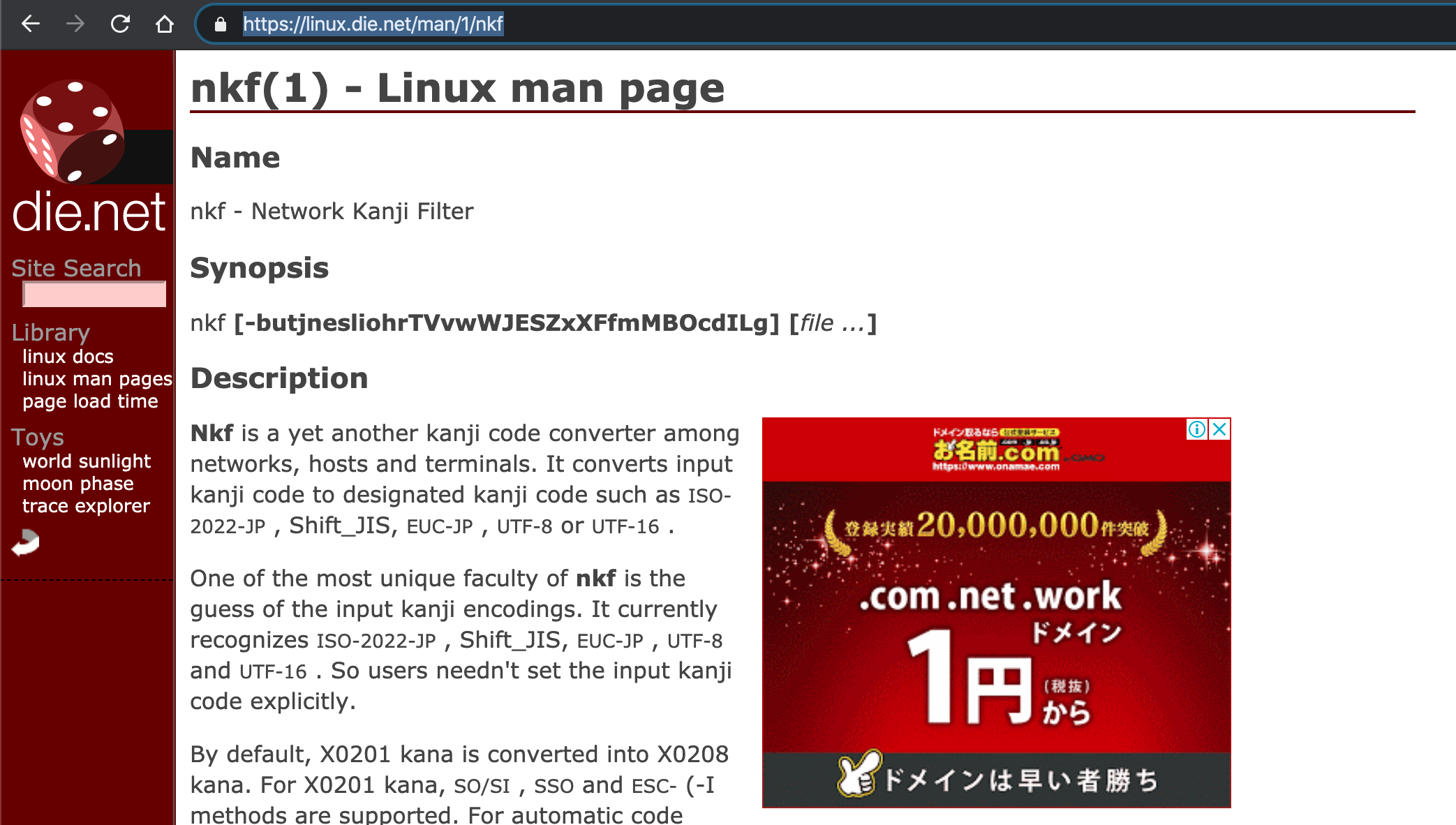$ nkf --guess tmp/abc.txt
Shift_JIS
nkfコマンドとは?
何やら日本語べったりのコマンドの気もするけど気のせいだろうか?気のせいだろう。
【 nkf 】コマンド――文字コードと改行コードを変換する:Linux基本コマンドTips(51) - @IT
https://www.atmarkit.co.jp/ait/articles/1609/29/news016.html
いや...
そういえばこんな意味のコマンドだったな...
nkf - Network Kanji Filter
https://linux.die.net/man/1/nkf
Nkf is a yet another kanji code converter among networks, hosts and terminals. It converts input kanji code to designated kanji code such as ISO-2022-JP , Shift_JIS, EUC-JP , UTF-8 or UTF-16 .
関連
調べ始めるとまた深いエンコーディングの森の中に入っていきそうだ...
NKF.guess はもう古い。国際化時代のコードセット(エンコーディング)推測法 - ksmakotoのhatenadiary
https://ksmakoto.hatenadiary.com/entry/2017/10/23/223230
man
$ man nkf | cat
nkf(1) nkf(1)
NAME
nkf - Network Kanji Filter
SYNOPSIS
nkf [-butjnesliohrTVvwWJESZxXFfmMBOcdILg] [file ...]
DESCRIPTION
Nkf is a yet another kanji code converter among networks, hosts and
terminals. It converts input kanji code to designated kanji code such
as ISO-2022-JP, Shift_JIS, EUC-JP, UTF-8, UTF-16 or UTF-32.
One of the most unique faculty of nkf is the guess of the input kanji
encodings. It currently recognizes ISO-2022-JP, Shift_JIS, EUC-JP,
UTF-8, UTF-16 and UTF-32. So users needn't set the input kanji code
explicitly.
By default, X0201 kana is converted into X0208 kana. For X0201 kana,
SO/SI, SSO and ESC-(-I methods are supported. For automatic code
detection, nkf assumes no X0201 kana in Shift_JIS. To accept X0201 in
Shift_JIS, use -X, -x or -S.
multiple options are specifed as seprate strings, such as
print nkf('--ic=UTF8-MAC', '-w', $string), "\n";
except the last arguments.
OPTIONS
-J -S -E -W -W16 -W32 -j -s -e -w -w16 -w32
Specify input and output encodings. Upper case is input. cf. --ic
and --oc.
-J ISO-2022-JP (JIS code).
-S Shift_JIS and JIS X 0201 kana. EUC-JP is recognized as X0201
kana. Without -x flag, JIS X 0201 Katakana (a.k.a.halfwidth
kana) is converted into JIS X 0208. If you use Windows, see
Windows-31J (CP932).
-E EUC-JP.
-W UTF-8N.
-W16[BL][0]
UTF-16. B or L gives whether Big Endian or Little Endian. 0
gives whther put BOM or not.
-W32[BL][0]
UTF-32. B or L gives whether Big Endian or Little Endian. 0
gives whther put BOM or not.
-b -u
Output is buffered (DEFAULT), Output is unbuffered.
-t No conversion.
-i[@B]
Specify the escape sequence for JIS X 0208.
-i@ Use ESC ( @. (JIS X 0208-1978)
-iB Use ESC ( B. (JIS X 0208-1983/1990 DEFAULT)
-o[BJ]
Specify the escape sequence for US-ASCII/JIS X 0201 Roman. (DEFAULT
B)
-r {de/en}crypt ROT13/47
-h[123] --hiragana --katakana --katakana-hiragana
-h1 --hiragana
Katakana to Hiragana conversion.
-h2 --katakana
Hiragana to Katakana conversion.
-h3 --katakana-hiragana
Katakana to Hiragana and Hiragana to Katakana conversion.
-T Text mode output (MS-DOS)
-f[m [- n]]
Folding on m length with n margin in a line. Without this option,
fold length is 60 and fold margin is 10.
-F New line preserving line folding.
-Z[0-3]
Convert X0208 alphabet (Fullwidth Alphabets) to ASCII.
-Z -Z0
Convert X0208 alphabet to ASCII.
-Z1 Convert X0208 kankaku to single ASCII space.
-Z2 Convert X0208 kankaku to double ASCII spaces.
-Z3 Replacing fullwidth >, <, ", & into '>', '<', '"',
'&' as in HTML.
-X -x
With -X or without this option, X0201 is converted into X0208 Kana.
With -x, try to preserve X0208 kana and do not convert X0201 kana
to X0208. In JIS output, ESC-(-I is used. In EUC output, SS2 is
used.
-B[0-2]
Assume broken JIS-Kanji input, which lost ESC. Useful when your
site is using old B-News Nihongo patch.
-B1 allows any chars after ESC-( or ESC-$.
-B2 force ASCII after NL.
-I Replacing non iso-2022-jp char into a geta character (substitute
character in Japanese).
-m[BQN0]
MIME ISO-2022-JP/ISO8859-1 decode. (DEFAULT) To see ISO8859-1
(Latin-1) -l is necessary.
-mB Decode MIME base64 encoded stream. Remove header or other part
before conversion.
-mQ Decode MIME quoted stream. '_' in quoted stream is converted to
space.
-mN Non-strict decoding. It allows line break in the middle of the
base64 encoding.
-m0 No MIME decode.
-M MIME encode. Header style. All ASCII code and control characters
are intact.
-MB MIME encode Base64 stream. Kanji conversion is performed
before encoding, so this cannot be used as a picture encoder.
-MQ Perform quoted encoding.
-l Input and output code is ISO8859-1 (Latin-1) and ISO-2022-JP. -s,
-e and -x are not compatible with this option.
-L[uwm] -d -c
Convert line breaks.
-Lu -d
unix (LF)
-Lw -c
windows (CRLF)
-Lm mac (CR)
Without this option, nkf doesn't convert line breaks.
--fj --unix --mac --msdos --windows
Convert for these systems.
--jis --euc --sjis --mime --base64
Convert to named code.
--jis-input --euc-input --sjis-input --mime-input --base64-input
Assume input system
--ic=input codeset --oc=output codeset
Set the input or output codeset. NKF supports following codesets
and those codeset names are case insensitive.
ISO-2022-JP
a.k.a. RFC1468, 7bit JIS, JUNET
EUC-JP (eucJP-nkf)
a.k.a. AT&T JIS, Japanese EUC, UJIS
eucJP-ascii
eucJP-ms
CP51932
Microsoft Version of EUC-JP.
Shift_JIS
a.k.a. SJIS, MS_Kanji
Windows-31J
a.k.a. CP932
UTF-8
same as UTF-8N
UTF-8N
UTF-8 without BOM
UTF-8-BOM
UTF-8 with BOM
UTF8-MAC (input only)
decomposed UTF-8
UTF-16
same as UTF-16BE
UTF-16BE
UTF-16 Big Endian without BOM
UTF-16BE-BOM
UTF-16 Big Endian with BOM
UTF-16LE
UTF-16 Little Endian without BOM
UTF-16LE-BOM
UTF-16 Little Endian with BOM
UTF-32
same as UTF-32BE
UTF-32BE
UTF-32 Big Endian without BOM
UTF-32BE-BOM
UTF-32 Big Endian with BOM
UTF-32LE
UTF-32 Little Endian without BOM
UTF-32LE-BOM
UTF-32 Little Endian with BOM
--fb-{skip, html, xml, perl, java, subchar}
Specify the way that nkf handles unassigned characters. Without
this option, --fb-skip is assumed.
--prefix=escape charactertarget character..
When nkf converts to Shift_JIS, nkf adds a specified escape
character to specified 2nd byte of Shift_JIS characters. 1st byte
of argument is the escape character and following bytes are target
characters.
--no-cp932ext
Handle the characters extended in CP932 as unassigned characters.
--no-best-fit-chars
When Unicode to Encoded byte conversion, don't convert characters
which is not round trip safe. When Unicode to Unicode conversion,
with this and -x option, nkf can be used as UTF converter. (In
other words, without this and -x option, nkf doesn't save some
characters)
When nkf converts strings that related to path, you should use this
opion.
--cap-input
Decode hex encoded characters.
--url-input
Unescape percent escaped characters.
--numchar-input
Decode character reference, such as "&#....;".
--in-place[=SUFFIX] --overwrite[=SUFFIX]
Overwrite original listed files by filtered result.
Note --overwrite preserves timestamps of original files.
--guess=[12]
Print guessed encoding and newline. (2 is default, 1 is only
encoding)
--help
Print nkf's help.
--version
Print nkf's version.
-- Ignore rest of -option.
AUTHOR
Copyright (c) 1987, Fujitsu LTD. (Itaru ICHIKAWA).
Copyright (c) 1996-2018, The nkf Project.
nkf 2.1.5 2018-12-15 nkf(1)
Original by Github issue
チャットメンバー募集
何か質問、悩み事、相談などあればLINEオープンチャットもご利用ください。

